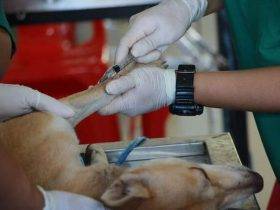Massachusetts Dog Bite Law
Dog bites can cause serious physical and emotional harm. In Massachusetts, the law holds dog owners responsible for protecting the public from dangerous dogs. This article provides an overview of Massachusetts dog bite law to help citizens understand their legal rights and responsibilities.
Strict Liability For Dog Bites
Massachusetts follows the principle of strict liability for dog bites. This means that a dog owner can be found legally responsible for damages from a dog bite even if the owner was not negligent or at fault.
The Massachusetts Dog Law recognizes that dogs have the capacity to cause harm, so owners have a duty to control their pets and prevent injuries to others. To successfully sue for damages from a dog bite in Massachusetts, a victim only needs to prove:
- The defendant owned or kept the dog;
- The dog bit the victim; and
- The victim suffered injuries as a result.
A victim does not need to show the owner knew or should have known the dog had dangerous propensities. Owners are strictly liable for managing their dogs to prevent bites from occurring.
Exceptions To Strict Liability
While strict liability generally applies, there are some exceptions where an owner can avoid legal responsibility for a dog bite:
Provocation: If the victim teased, tormented, abused or assaulted the dog in a manner that would provoke an average dog, the owner may not be liable. However, merely looking at or walking near a dog does not constitute provocation.
Trespasser on Owner’s Property: A dog owner is not liable for bites that occur if the victim was trespassing on the owner’s fenced or posted property. But owners still must use reasonable care if they know a trespasser is present.
Unpredictable Behavior: If a bite resulted from unpredictable behavior that was normal for the particular type or class of dog, and the owner took reasonable care to prevent injury, liability may be avoided. This exception is very narrow.
The exceptions aim to balance personal responsibility with public safety. Overall, Massachusetts law strongly encourages owners to properly confine and control their dogs to avoid liability for bites.
Defining A Dangerous Dog
Some dogs may be declared “dangerous” under Massachusetts law based on their behavior and bite history. The definition of a “dangerous dog” is:
- Any dog that bites a person, without provocation, and causes serious injury or death; or
- Any dog that bites a person, without provocation, and the owner has received one or more previous citations for the dog biting or attacking a person or domestic animal.
A dangerous dog designation carries additional legal obligations for owners to control and restrain the dog. Failure to comply can lead to fines or criminal charges if the dog injures someone in the future.
Requirements For Owners Of Dangerous Dogs
Owners of dogs declared dangerous by a community face enhanced regulations, including requirements to:
- Spay/neuter the dog if over six months old;
- Obtain a dangerous dog license from the local clerk’s office and pay annual fees;
- Have the dog tattooed or microchipped for permanent identification;
- Post clear signs on the property warning that a dangerous dog lives there;
- Maintain liability insurance of at least $100,000 to cover future injuries;
- Indoors confine the dog or keep it in a secure, locked pen when outdoors;
- Use a sturdy leash no more than 6 feet when walking the dog in public.
Failure to comply with requirements for owning a dangerous dog could subject the owner to civil penalties of up to $500 or criminal charges under certain circumstances.
Filing A Dog Bite Claim
To make a claim for injury compensation after a dog bite, victims should gather evidence and consult with an experienced personal injury attorney. Key steps include:
Seeking Medical Attention: Obtain professional medical treatment promptly. Medical records will document the nature and extent of injuries.
Contacting Animal Control: Report the bite to help identify the dog and owner. Animal control officers will investigate to determine if quarantine or testing is needed.
Getting Witness Information: Collect names and contact details of anyone who saw the incident. Written statements can corroborate details later.
Taking Photos: Photograph injuries, the scene, and anything that may be relevant like warning signs. Photos preserve evidence that can strengthen a claim.
Notifying the Owner: Inform the dog owner in writing of the incident and injuries within 7 days as required by law. Send by certified mail to create proof of notice.
Filing a Civil Lawsuit: If filing suit, the standard statute of limitations for personal injury claims in Massachusetts is 3 years from the date of injury. But consult an attorney right away.
With the right evidence and legal guidance, victims have the strongest position to negotiate a fair settlement or prove liability before a judge or jury if needed. The laws aim to compensate those injured through no fault of their own.
helpful Resources on Massachusetts Dog Laws
Staying informed is key to exercising rights and responsibilities regarding Massachusetts dog laws. Helpful reference resources include:
Massachusetts General Laws Chapter 140: Contains all statutes governing pet ownership, including definitions of terms like “dangerous dog” and requirements for owners.
Animal Control Departments: Contact local animal control for information on specific community ordinances, dangerous dog declarations, licensing requirements and dog bite investigation procedures.
Massachusetts Bar Association: Offers free legal resources and self-help guides related to personal injury claims. Consult an attorney for advice tailored to your individual case.
American Veterinary Medical Association: Provides best practices on dog training, behavior modification, bite prevention strategies and liability issues all pet owners should understand.
Insurance: Homeowners or renters insurance may provide liability coverage for dog bites depending on policy terms. Review coverage details with your insurance agent.
Staying up-to-date on local and state dog laws empowers both citizens and responsible owners. Knowing rights and risks helps promote public safety and fair resolution when injuries do occur due to dog bites. With shared responsibility, communities can work to prevent bites whenever possible.
Conclusion
Dog bites present complex legal issues, but Massachusetts dog law provides a clear framework to balance owner accountability with victim compensation. By understanding strict liability, requirements for dangerous dogs, and the claims process, all parties can make well-informed decisions and take appropriate precautions. Ultimately, the goal of Massachusetts dog bite law statutes aims to encourage responsible pet ownership practices that better protect the public from harm. With open access to legal resources and shared commitment to safety, communities can work to prevent injuries from occurring in the first place whenever possible.





Leave a Reply